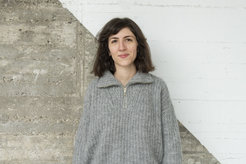"This is us" - Questions for Marwa El Zein
Our institute has over 300 employees. But that is just a number. Who are the people at our institute? What do they do and what drives them? In our "This is us" format, colleagues answer questions about their work and their motivation.

On the occasion of International Women's Day on March 8, 2023, we started the series “This is us” with 15 female scientists from our institute. We are picking up where we left off and introducing the scientist Marwa El Zein from the Center for Adaptive Rationality. In the last episode we introduced Anika Löwe from the MPRG NeuroCode.
One of your research topics at the Center for Adaptive Rationality is the group dynamic and mechanisms behind collective decision-making. What fascinates you about this topic?
Group decisions are ubiquitous, occurring in our daily lives with family and friends, in the workplace, and at the societal level for community-related and political matters. What fascinates me about this topic is its broad applicability to a range of societal issues, explaining our behaviors in various contexts. I hold an optimistic view of the positive impact of group behaviors in society, consistently emphasizing the advantages of collaboration. Understanding the mechanisms behind group decisions and dynamics is crucial. This knowledge enables us to guide society towards beneficial group actions, promoting better individual and group well-being, fairness, cooperation, and improved decision-making.
You recently had aresearch stay in Paris. What kind of research were you doing there?
My current research investigates how feelings of belonging to a group, such as a sports team or one's own country, affect our collective decision-making behavior. During my research stay at a political research center in Paris (CEVIPOF, Sciences Po), I pondered on potential applications of this research to political behaviors, such as voting patterns and news consumption within social bubbles. Engaging with researchers from political science has enriched my perspective, providing interdisciplinary insights into my work. Additionally, I'm teaching a master's course at the Sciences Po School of Public Affairs on behavioral insights and political behaviors, highlighting how findings from cognitive and behavioral science contribute to public policy.
You will leave the MPIB. Where will you go next? Will you stay in the scientific field?
Leaving the MPIB marks the end of my 11-year academic journey, including my PhD. As mentioned earlier, I have been conducting research on topics of high societal relevance. After years of contemplation and consideration of my career path, I have decided to pursue my desire to engage in applied research and take on a role that allows for a more direct impact on societal issues. I am set to start a position as a Senior Research Consultant in Cognitive and Behavioral Sciences at a company in Paris. In this role, I aim to apply my research expertise to behavior change in various sectors, including work, education, health, and the public sector. I hope that my ongoing collaborations with the research community will enable me to maintain a connection to the academic world, allowing me to stay updated on the latest research while working with people in the field.
When did you realize you wanted to go into science, and what advice would you give your younger self about starting a career in science?
I've been drawn to science since my school years, initially captivated by genetics, which led me to pursue a bachelor's degree in biology. During my studies, I encountered neuroscience, a field that was unfamiliar to me in my home country, Lebanon. This exposure ignited my passion for brain sciences, prompting me to delve into literature and attend conferences. I subsequently pursued a master's degree in cognitive science, and it became evident that my true interest lay in social cognition—understanding humans in their social environment.
Looking back, I would still encourage my younger self to follow the same path, as working in academia has been incredibly fulfilling. It teaches autonomy and imparts new skills every day, offering a continuous learning experience. However, I would advise my younger self to be more open to and explore applied research and opportunities outside academia. Training in that direction can be a deliberate choice rather than a response to academic competition. Additionally, I would recommend taking more time between work experiences to reflect on career paths.
What did you appreciate about the Max Planck Community?
The Max-Planck Institute offered exposure to a community of excellent interdisciplinary researchers. There were regular scientific talks from different groups that enriched my experience. The environment was also very rich, providing a variety of methods and support to conduct our research most appropriately. I hope I will be able to stay in touch with this community.
